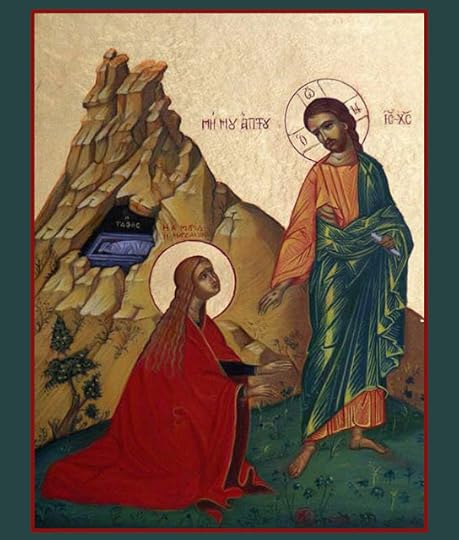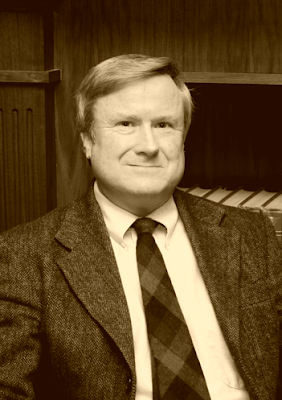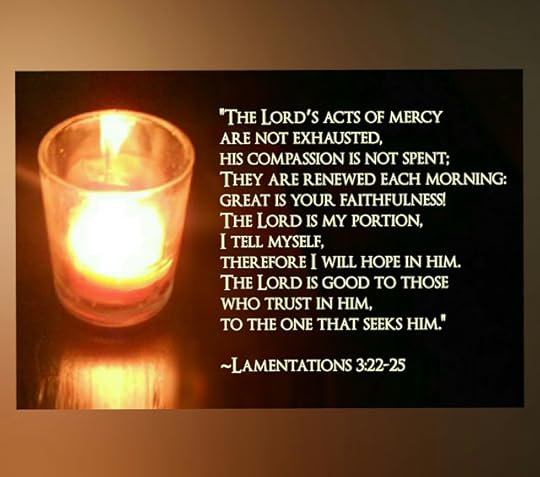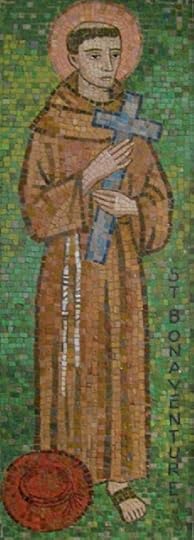John Janaro's Blog, page 148
July 28, 2019
Be Not Afraid!
Published on July 28, 2019 18:57
July 27, 2019
The Burning of Grief and Love
 This is a strange time of life.
This is a strange time of life.Lately, as I go through the "usual day," I keep bumping into things that remind me of my Dad: a picture, an old book, some music, or even some things not directly connected to him - common things like ivy (because Dad always trimmed the ivy and kept it neat along the side of the house I grew up in).
When this happens, a whole line of memories gets tapped, and with them come a variety of emotions that I don't even understand, and the awareness of the deep presence of a person in the history of my life, and an apparently gaping absence of that person "here-and-now" ... though not entirely. Past and present seem almost to merge for an instant, and I feel a sense of melancholy, but also peace.
Is this "grief"?
It hasn't shaken my faith, though it has made me more aware that faith depends on God's grace and that it adheres to mysteries beyond my comprehension. Clearly, faith does not provide a cheap escape from the pain and the strangeness of grief. I am grateful for my faith, which is a gift that takes me beyond myself. It brings consolation, but it is also the adherence of a frail human being who lives within the fragility of the present, with the fluxuations of internal and external changes from one moment to the next.
It's a mysterious experience that, sooner or later, everyone passes through.
We miss the people we love so much! When people die, they seem to vanish from the realm of everything we know from our experience of life, all that we see and feel and touch, all that we can measure and analyze scientifically or engage with on an ordinary practical level.
But there is still love - a light and a fire greater than the sun and all the stars. Stars burn out, but love burns through to something more, something larger than this universe and its limits. When I say "I love you" to my Dad (I feel dizzy and lost in the fog of all this, but still "I love YOU, Dad!") and whenever we say "I love you" to those who have passed away from this life, our hearts "find them" in their very reality as persons; and our hearts know that they are living in a new way.
They live in the Universe of Love, which our eyes are not designed to see (at least, not yet) but our hearts know it.
Our hearts long for it!
Maybe the pain of grief is part of our own "burning through" (beyond the limits of what we now know and measure) to that definitive world, that definitive life that our hearts whisper about, that is the promise of all our efforts to grow as persons - that Universe where Love is everything, where the embrace is all-sustaining, all-fulfilling, and never ends.
Published on July 27, 2019 17:51
July 24, 2019
Splashdown 50
FIFTY YEARS AGO TODAY was "The Splashdown," i.e. the "returning them safely to earth" part of the historic journey of Apollo 11.
And, once again, we all watched on TV.

And, once again, we all watched on TV.

Published on July 24, 2019 17:58
July 22, 2019
Mary Said, "I Have Seen the Lord"
Today we celebrate the feast of Saint Mary Magdalene, called ἰσαπόστολος in the Byzantine tradition ("Equal-to-the-Apostles") for her original witness to Jesus's resurrection:
Jesus said to her, "go to my brothers and tell them, ‘I am going to my Father and your Father, to my God and your God.’ Mary of Magdala went and announced to the disciples, 'I have seen the Lord'" (John 20:17-18). .

Jesus said to her, "go to my brothers and tell them, ‘I am going to my Father and your Father, to my God and your God.’ Mary of Magdala went and announced to the disciples, 'I have seen the Lord'" (John 20:17-18). .

Published on July 22, 2019 12:23
July 21, 2019
July 20, 1969 - A "Giant Leap" Indeed
 Fifty years ago, three human beings traveled from a beach in southern Florida to the moon, a voyage of a quarter of a million miles. Before the end of the day on July 20, two men would walk the lunar surface.
Fifty years ago, three human beings traveled from a beach in southern Florida to the moon, a voyage of a quarter of a million miles. Before the end of the day on July 20, two men would walk the lunar surface."That's one small step for [a] man, one giant leap for mankind," said Neil Armstrong as he planted his boot firmly on the dusty, unearthly ground.
"Beautiful... Magnificent desolation," said Edwin "Buzz" Aldrin, a few moments later as he stepped down from the lunar module to become the second human being to walk on the moon.
Sixty miles above the lunar surface, orbiting the moon (about once every two hours) was Michael Collins, pilot of the Command Service Module. Though he didn't get to walk on the moon, he had the essential task of carefully attending to the larger traveling spacecraft and the rockets, which were the only way any of them would get back home.
Meanwhile, a six year old me was on earth, fascinated, and - along with hundreds of millions of other people all over the world - watching it all happen on television. I remember it vividly, hearing the beeps and the crackles of earth-to-moon and moon-to-earth audio, and seeing a fuzzy but unmistakable image of an astronaut going down those steps. My parents, my brother and I watched it in our living room, on our black-&-white TV (we didn't have a color TV yet). People from my generation or older remember, and can tell you where they were and what time of night or day it was when they saw the "giant leap" on TV.
.
 But even as we watched history being made on July 20, 1969, we all participated in another historic moment on earth, and most of us were unaware of its radical nature and fundamental importance for the coming decades: we were watching the first ever global live television broadcast.
But even as we watched history being made on July 20, 1969, we all participated in another historic moment on earth, and most of us were unaware of its radical nature and fundamental importance for the coming decades: we were watching the first ever global live television broadcast.Over the past fifty years, the communications technology that accompanied the Apollo mission has developed in ways no one could have imagined, so that now billions of people interact on a global level every day. People today develop and share multimedia content, and are able to "broadcast," "live" (in real time), in a manner accessible to the whole world, right from the palm of their hand.
Published on July 21, 2019 16:57
July 20, 2019
"Man on the Moon"
"Man on the moon! Whew... oh boy! Oh boy!"
~Walter Cronkite, CBS News television studio, 4:17 PM E.D.T., July 20, 1969

~Walter Cronkite, CBS News television studio, 4:17 PM E.D.T., July 20, 1969

Published on July 20, 2019 15:37
July 19, 2019
Saying Goodbye to an Old Friend
 Today was the funeral of Patrick Keats, Professor of English Literature at Christendom College, who recently died of cancer.
Today was the funeral of Patrick Keats, Professor of English Literature at Christendom College, who recently died of cancer.Christendom is the small American university with which I am affiliated, where I taught in the classroom for many years before my illness, and which my children now attend (John Paul recently graduated).
These are just a few words of farewell to Pat. It's all I can manage now. I'll write at greater length soon. I have more good memories of this superb man than I can begin to articulate at this time.
I'm quite "behind" in the task of putting recent losses into writing. Another beloved colleague at our school, Kris Burns, passed away the day before my father. I have much to say in her honor too, when the storm-of-everything this year settles down a bit (I hope). Indeed, I haven't yet been able to write an adequate tribute to Dad. Perhaps it will all just come in bits and pieces. It's a lot easier to write theology or historical /biographical essays than it is to find the words to say "goodbye" to people one really cares about.
This difficulty remains even when one knows that the "goodbye" is not forever. It's not the last word.
Pat was my friend for over a quarter of a century. He was a great colleague, and a huge help to me personally in my own most difficult days. He was also a professor to the Janaro kids, and producer/director of theatrical productions in which they participated.
In a small institution full of "large personalities," he was always focused on the students, the community, and his work, which he carried out cheerfully and - it seemed - tirelessly. He was also a loving husband and devoted father. He was a man of strong principle, balanced judgment, and discretion, with a fine sense of humor and - above all - abundant charity.
He was a pillar of our local community. It is not a formality to say that he will be greatly missed.
Rest in peace, Pat. May God give you the unfading crown of glory. You served Him well. Our prayers remain with you always, and especially for your courageous wife Lily and the kids.
God's ways are mysterious. He Himself is the Infinite Mystery. But He is the Mystery of infinite goodness and love. He permits evil in the world, only so that the mystery of His love might work a greater good. This must be the truth; yet these are hard words for our small humanity. In the face of our own suffering, they leave us gasping for air.
If all we had was an abstract theory, a metaphysical theodicy, we wouldn't even be able to begin to bear it. But we know that the love of God embraces us through the heart of Jesus Christ, who has taken all our sufferings upon Himself and made them His own. He goes before us, He accompanies us, He is with us in everything we endure; He is transforming us and calls us to the fullness of His love and joy.
To Him we entrust our friend and brother Pat Keats, in the hope of the resurrection.
"The Lord is good to those who trust in Him, to the one that seeks Him" (Lamentations 3:25).

Published on July 19, 2019 17:39
July 18, 2019
To All Caregivers: THANK YOU!❤
I just want to shout out to those who care for the sick on this celebration of Saint Camillus. The care you provide is a blessing for the world. I have received a fair share of it, and I have watched you give care to people I love. My gratitude is beyond expression, but I extend it to all of you who dedicate yourselves to this merciful work. God bless you! #HealthcareWorkers #Nurses #Doctors #Caregivers #AllOfYou




Published on July 18, 2019 20:44
July 16, 2019
"Worldliness" Fails to See the Goodness of Things
I have continued to ponder the distinction between the "attraction" for "worldly goods" which Saint Bonaventure identifies as the root of avarice, and the personal understanding and engagement of the things of space and time that largely constitutes the ordinary human vocation.
 This is an important distinction that Bonaventure certainly recognizes. He articulates elsewhere his theology of material creation in terms of a highly original (Augustinian inspired) symbolic mystical realism. This unmistakably Catholic Christian realism about the goodness of all created things is a basic theme for Bonaventure (see e.g. Itinerarium Mentis Ad Deum I:14-15, usually found in English translation as "The Journey of the Mind to God"). It is entirely different from pagan neoplatonism, gnostic spiritualism, and especially the dualism and vilification of material reality put forth by Bonaventure's contemporaries in the Albigensian sect.
This is an important distinction that Bonaventure certainly recognizes. He articulates elsewhere his theology of material creation in terms of a highly original (Augustinian inspired) symbolic mystical realism. This unmistakably Catholic Christian realism about the goodness of all created things is a basic theme for Bonaventure (see e.g. Itinerarium Mentis Ad Deum I:14-15, usually found in English translation as "The Journey of the Mind to God"). It is entirely different from pagan neoplatonism, gnostic spiritualism, and especially the dualism and vilification of material reality put forth by Bonaventure's contemporaries in the Albigensian sect.
Genuine Christian faith entails the conviction that created things are good. As humans, we are meant to be "attracted" by the good in creatures, drawn to desire and love them, and drawn toward God through them, drawn to love God preeminently, who is the source and fulfillment of the being and goodness of created things.
The problem is not "attraction" in itself. The problem is the mess that sin has made of our humanity. It is not that things themselves are evil; rather it is our sinful self-obsession, our drive to construct the foundation of our selves in things that we control by our own power, that skews our perception of their essential, gratuitous fullness.
We become "worldly" (and avaricious) insofar as we willingly blind ourselves to the reality of the world as the place where embodied persons give and receive love in the multitude of its physical expressions. Our "worldly desire" perceives only "worldly goods," things only insofar as they are subject to our own grasping and manipulation.
Thus we do violence to the world God has created in the gift of His love. We covet, take, steal, hoard, violate, and destroy things because we refuse to receive them and give them. When we forget the gift of God, we cannot engage reality: we don't know how to "possess" things with freedom, to learn from them, deepen them by "collaborating" with their riches and marking them with the seal of our own personal creativity, and thus being able to give of ourselves through them. We are the ones who have brought evil and destruction into the world; we have made the world a deceitful, harmful, dangerous place.
But God loves the world. He loves us. The Father reveals the depths of this love by sending His Son, Jesus, the Word made flesh, who dwells among us, accompanies us, dies for us (and thus stays with us even through death) so He can raise us up, heal us, and transform us by joining us to Himself and drawing our hearts to Him.
In following Him we rediscover all the created things of the world in Him. We begin to see ourselves and all things as having their true meaning in Him and for Him. There is nothing reductive about this, because reality is ultimately personal and interpersonal. The encounter with the Person of Jesus is decisive because He fulfills and transcends (in infinite depth) every person and every thing.
In Him, our lives and everything on our earthly path is transfigured. Even though it doesn't often seem that way, as we trudge through our often difficult and lonely days, we hold onto the truth in love and hope, through faith in Jesus who has gone before us in death to resurrection. Thus we learn to engage the world passionately, attentively, but with peace and joy in our hearts, because we know that Jesus Christ has saved the world.
 This is an important distinction that Bonaventure certainly recognizes. He articulates elsewhere his theology of material creation in terms of a highly original (Augustinian inspired) symbolic mystical realism. This unmistakably Catholic Christian realism about the goodness of all created things is a basic theme for Bonaventure (see e.g. Itinerarium Mentis Ad Deum I:14-15, usually found in English translation as "The Journey of the Mind to God"). It is entirely different from pagan neoplatonism, gnostic spiritualism, and especially the dualism and vilification of material reality put forth by Bonaventure's contemporaries in the Albigensian sect.
This is an important distinction that Bonaventure certainly recognizes. He articulates elsewhere his theology of material creation in terms of a highly original (Augustinian inspired) symbolic mystical realism. This unmistakably Catholic Christian realism about the goodness of all created things is a basic theme for Bonaventure (see e.g. Itinerarium Mentis Ad Deum I:14-15, usually found in English translation as "The Journey of the Mind to God"). It is entirely different from pagan neoplatonism, gnostic spiritualism, and especially the dualism and vilification of material reality put forth by Bonaventure's contemporaries in the Albigensian sect.Genuine Christian faith entails the conviction that created things are good. As humans, we are meant to be "attracted" by the good in creatures, drawn to desire and love them, and drawn toward God through them, drawn to love God preeminently, who is the source and fulfillment of the being and goodness of created things.
The problem is not "attraction" in itself. The problem is the mess that sin has made of our humanity. It is not that things themselves are evil; rather it is our sinful self-obsession, our drive to construct the foundation of our selves in things that we control by our own power, that skews our perception of their essential, gratuitous fullness.
We become "worldly" (and avaricious) insofar as we willingly blind ourselves to the reality of the world as the place where embodied persons give and receive love in the multitude of its physical expressions. Our "worldly desire" perceives only "worldly goods," things only insofar as they are subject to our own grasping and manipulation.
Thus we do violence to the world God has created in the gift of His love. We covet, take, steal, hoard, violate, and destroy things because we refuse to receive them and give them. When we forget the gift of God, we cannot engage reality: we don't know how to "possess" things with freedom, to learn from them, deepen them by "collaborating" with their riches and marking them with the seal of our own personal creativity, and thus being able to give of ourselves through them. We are the ones who have brought evil and destruction into the world; we have made the world a deceitful, harmful, dangerous place.
But God loves the world. He loves us. The Father reveals the depths of this love by sending His Son, Jesus, the Word made flesh, who dwells among us, accompanies us, dies for us (and thus stays with us even through death) so He can raise us up, heal us, and transform us by joining us to Himself and drawing our hearts to Him.
In following Him we rediscover all the created things of the world in Him. We begin to see ourselves and all things as having their true meaning in Him and for Him. There is nothing reductive about this, because reality is ultimately personal and interpersonal. The encounter with the Person of Jesus is decisive because He fulfills and transcends (in infinite depth) every person and every thing.
In Him, our lives and everything on our earthly path is transfigured. Even though it doesn't often seem that way, as we trudge through our often difficult and lonely days, we hold onto the truth in love and hope, through faith in Jesus who has gone before us in death to resurrection. Thus we learn to engage the world passionately, attentively, but with peace and joy in our hearts, because we know that Jesus Christ has saved the world.
Published on July 16, 2019 12:56
July 15, 2019
Saint Bonaventure: "Follow the Poverty-Stricken Christ"
 Every year, in the middle of July, when his feast day rolls around, I think, "Gosh, I haven't read Saint Bonaventure since... like... last year." So I look something up. I have those five volumes in English that the Franciscans published years ago, on one of the few shelves in the house that actually stays organized.
Every year, in the middle of July, when his feast day rolls around, I think, "Gosh, I haven't read Saint Bonaventure since... like... last year." So I look something up. I have those five volumes in English that the Franciscans published years ago, on one of the few shelves in the house that actually stays organized.The Seraphic Doctor, the great medieval Franciscan and contemporary of St Thomas Aquinas, can be appreciated in many theoretical ways, but we are missing something fundamental if we never get burned while reading him.
Bonaventure is a fire. He is like a burning bush. You wonder if you can look upon the flame in him and continue to live.
Maybe this is why I only read him once a year.
Here are words written seven and a half centuries ago that cut through the differences of history and context and speak directly to us today.
Below are some excerpts from chapter III of De Perfectione Vita ad Sorores, a short work written for the edification of the Poor Clares. I felt the heat from the fire of these words today. In their light I see what a hypocrite I am, what a mediocre half-hearted lukewarm Christian I really am. At the same time, they also awaken in me the desire to be changed. Bonaventure is emphasizing that defining accent of the Franciscan spirit: poverty. But he didn't use this sort of terminology; he simply preached about the poverty of Jesus.
Granted, his words are directed to cloistered nuns, but that doesn't mean that they have no relevance for people living in the world. Bonaventure is convinced that the example of Jesus should inspire not only consecrated persons, but all Christians to a love of poverty.
We argue and scheme and wring our hands about our society today, our social problems, and the "need for change." How often do we consider the possibility of cultivating in our own lives the simplicity, trust, and poverty of spirit that pervade the Gospel and the witness of the saints?
It is a possibility, because God makes it possible for us. We fall short because we fail to respond to His love for us. He wants to kindle a fire in us but we remain cold. And sad.
Bonaventure exhorts us to ponder the humanity of Jesus in meditative prayer. The more we remember this man who reveals and communicates the love of God, the more He will draw us to Himself, change us, set us aflame.
"Christ was born poor, lived poor, and died poor. Realise and bear in mind that Christ gave you this wonderful example of poverty in order to induce you to become a friend of poverty. Our Lord Jesus Christ was so poor at birth that He had neither shelter, nor clothing, nor food. In lieu of a house He had to be content with a stable. A few wretched rags did duty for clothes. For food He had milk from the Virgin's breast. It was meditation on this poverty of Christ that roused the heart of St Paul and caused him to exclaim: 'You know the grace of Our Lord Jesus Christ, that being rich He became poor for our sakes, that through His poverty we might be rich' (2 Corinthians 8:9).
"St Bernard, speaking of this same poverty, says: 'An eternal and copious abundance of riches existed in Heaven. Poverty, however, was not to be found there. It abounded and was superabundant on earth. Alas! Man did not know its worth. The Son of God, though, loved poverty, and desired it, and came down from Heaven and took it as His own possession in order to make it precious in our eyes' (Sermons I, 5).
"All His life long, Jesus Christ Our Lord was an example of poverty... He was so poor that oftentimes He did not know which way to turn for a lodging. Frequently, He and His Apostles were compelled to wander out of the city and sleep where they could. It is with reference to such a happening that St Mark the Evangelist writes: 'Having viewed all things round about, when now the eventide was come, He went out to Bethany with the twelve' (Mark 11:7)... In similar strain St Matthew writes: "The foxes have holes and the birds of the air nests, but the Son of Man has nowhere to lay His head' (Matthew 8:20).
"Added to the poverty of His birth and life was the poverty of the death of the King of Angels... Look at His poverty as He dies. His executioners stripped and robbed Him of everything He possessed. He was robbed of His clothes, I repeat it, when the executioners 'divided His garments between them, and for His vesture cast lots' (cf Matthew 27:35, Psalm 22:19).
"He was robbed of body and soul, when as He succumbed to His most bitter sufferings His soul was separated from His body in the pangs of death. His persecutors deprived and robbed Him of His divine glory when they refused 'to glorify Him as God,' (cf Romans 1:21) and instead treated Him as a common criminal. 'They have stripped me of my glory,' complains holy Job in a moment of prophecy (cf Job 19:9).
"Drawing a lesson from the compelling example of Christ's poverty, St Bernard writes: 'Think of the poor man Christ! There is no house for Him at His birth, so they lay Him in a manger, between an ox and an ass. Look at Him wrapped in wretched swaddling clothes! Think of Him a fugitive on the rough road to Egypt! Think of Him riding on an ass! Think of His poverty as He hangs on the cross' (Sermons III, 1)."
Then the text invites us to consider our own anxiety over status and possessions, and how far removed this is from the poverty of Christ. We worry about temporal things. We are preoccupied with the concerns of this life. Our lives are so much taken up with grasping for worldly success and security, and fear of failure and deprivation. Why?
"Did you never read, did you never hear what Christ the Lord said of poverty to His Apostles? It occurs in the Gospel of St Matthew. 'Be not solicitous, therefore, saying, what shall we eat, or, what shall we drink. Your Father knows that you have need of all these things' (Mt 6:31-32)... [You are encouraged to be free of anxiety and to trust in God:] 'Cast, therefore, all your care upon Him, for He has care of you' (1 Peter 5:7).
"Since the fatherly care and solicitude of God for us is so intense, should not our anxious longing for temporal things cause us to marvel? Should it not astound us that we are eaten up with desire for vain and empty things? Why, when God occupies Himself with our welfare, do we trouble ourselves so about things of wealth and things of little concern?
"I can find no other explanation than that we have become avaricious. Avarice, avarice, the mother of confusion and damnation, has taken hold of us. We may assign no other reason than that we have turned away our affections from God, our Salvation. The fire of Divine Love has become extinguished in us. We have cooled. Love for God has frozen within us. If we were really fervent and had really stripped ourselves of earthly things we should follow the poverty-stricken Christ. Men when they become excessively hot are accustomed to strip themselves of their clothes. The proof of our want of love and of our great coldness is the attraction which worldly goods possess for us."
Published on July 15, 2019 18:14




